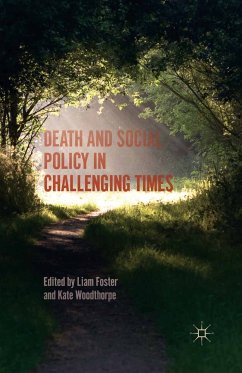
Death and Social Policy in Challenging Times (eBook, PDF)
Versandkostenfrei!
Sofort per Download lieferbar
40,95 €
inkl. MwSt.
Weitere Ausgaben:

PAYBACK Punkte
20 °P sammeln!
The study of death has the capacity to bring together a range of policy areas. Yet death is often overlooked within policy debates in the UK and beyond, and within gerontology. Bringing together a range of scholars engaged in policy associated with death, this collection provides a holistic account of how death factors in social policy. Within this, issues covered include inheritance, palliative care, euthanasia, funeral costs, bereavement support, marginalised deaths and disposal practices. At the heart of the book, the volume recognises that the issues identified are likely to intensify and ...
The study of death has the capacity to bring together a range of policy areas. Yet death is often overlooked within policy debates in the UK and beyond, and within gerontology. Bringing together a range of scholars engaged in policy associated with death, this collection provides a holistic account of how death factors in social policy. Within this, issues covered include inheritance, palliative care, euthanasia, funeral costs, bereavement support, marginalised deaths and disposal practices. At the heart of the book, the volume recognises that the issues identified are likely to intensify and expand over the next twenty years, as death rates continue to rise.
Dieser Download kann aus rechtlichen Gründen nur mit Rechnungsadresse in A, B, BG, CY, CZ, D, DK, EW, E, FIN, F, GR, HR, H, IRL, I, LT, L, LR, M, NL, PL, P, R, S, SLO, SK ausgeliefert werden.












